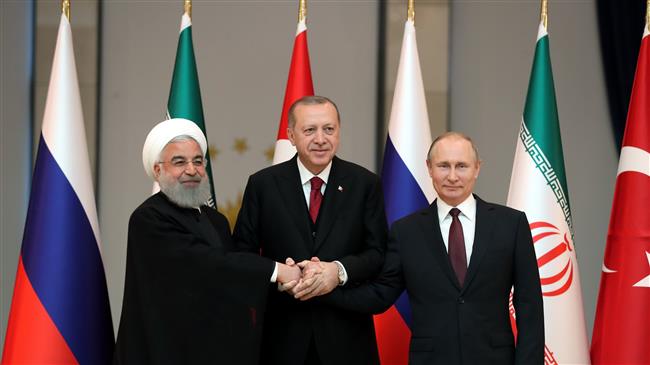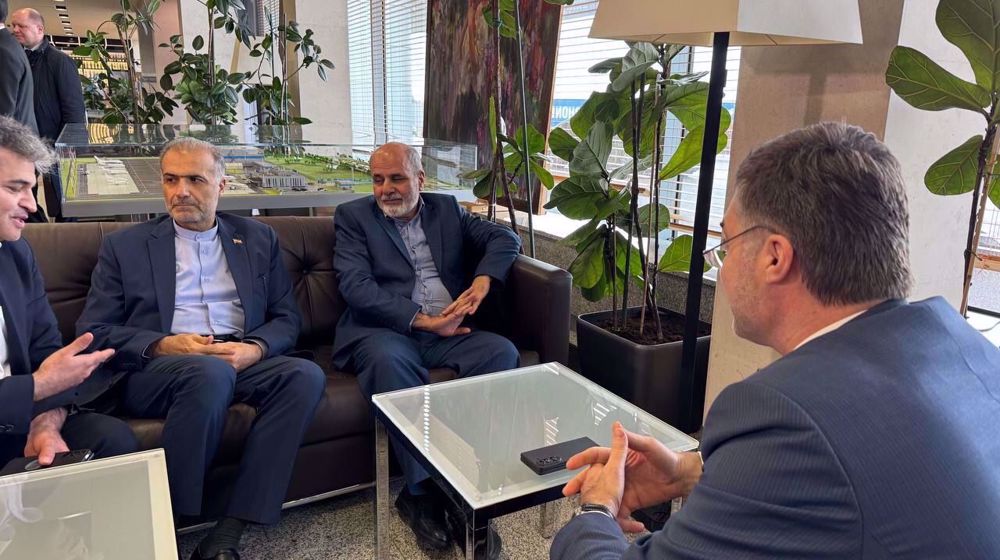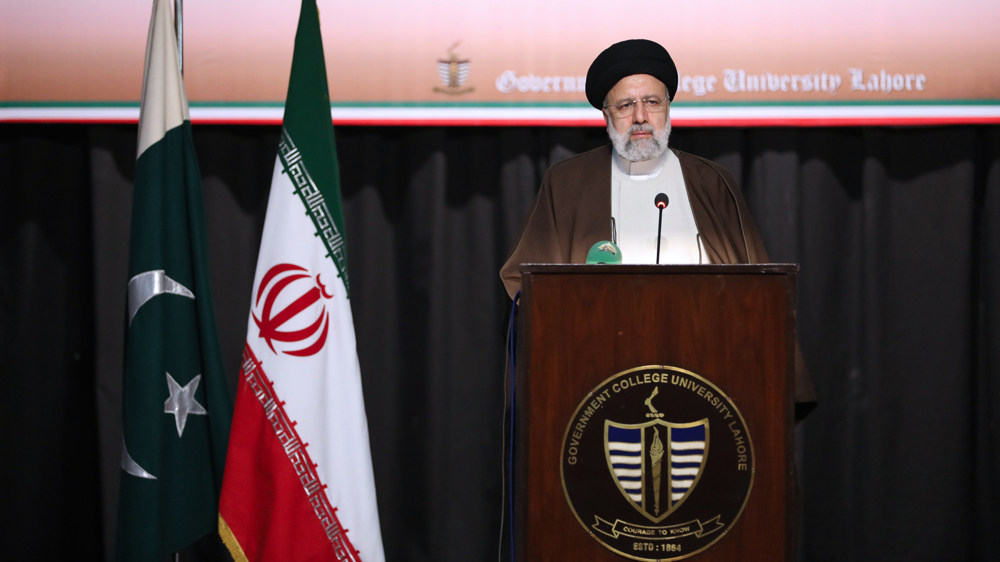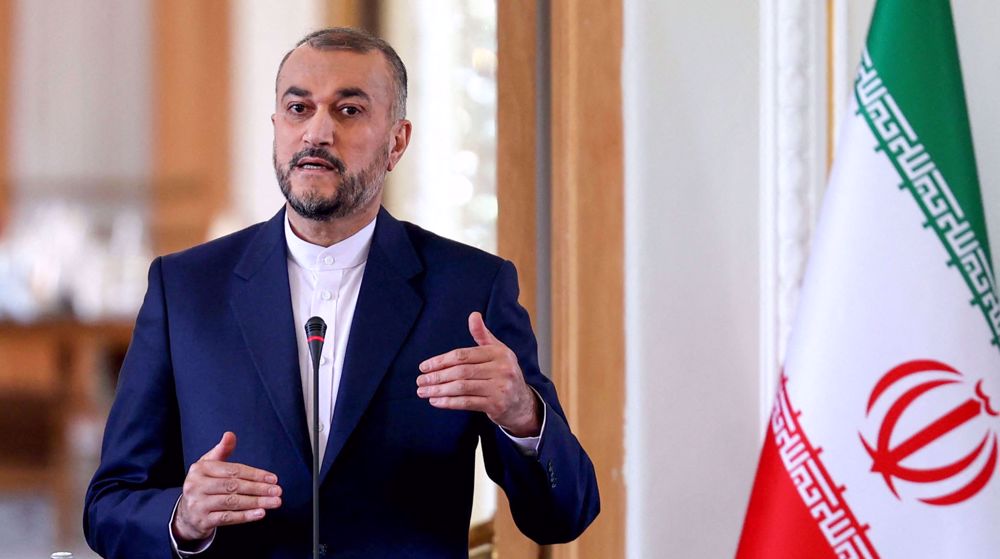Presidents of Iran, Russia, Turkey vow to cooperate to achieve sustainable peace in Syria
The presidents of Iran, Russia and Turkey have reaffirmed their commitment to work toward achieving a sustainable ceasefire between warring sides in Syria and bringing peace and stability to the war-torn Arab country.
Iran’s Hassan Rouhani and his Russian and Turkish counterparts, Vladimir Putin and Recep Tayyip Erdogan, “reaffirmed their determination to continue their active cooperation on Syria for the achievement of lasting ceasefire between the conflicting parties and advancement of the political process envisaged by UN Security Council Resolution 2254,” said a joint statement issued at the end of the meeting of the three leaders in Ankara on Wednesday.
In the statement, Rouhani, Putin and Erdogan also emphasized their “strong and continued commitment to the sovereignty, independence, unity, territorial integrity and non-sectarian character of Syria.”
They also stressed that there could be “no military solution” to the Syrian conflict and that the conflict could be settled only through a “negotiated political process.”
The presidents of Iran, Russia and Turkey, whose countries act as guarantors of the Syria ceasefire, also reaffirmed their determination to continue their cooperation in order to ultimately eliminate Daesh, Nusra Front and all other individuals, groups, and entities associated with al-Qaeda or Daesh as identified by the UN Security Council and underscored the success of their collective efforts in the fight against international terrorism.

They also underscored their joint determination to “speed up their efforts to ensure calm on the ground and protect civilians in the de-escalation areas as well as to facilitate rapid, safe and unhindered humanitarian access to these areas” and emphasized that the creation of de-escalation areas was temporary as provided for by their agreement of May 4, 2017.
They also expressed their satisfaction with the outcomes of the first year of the Astana meetings held since January 2017. They underlined that the Astana format had been the only effective international initiative that had helped reduce violence across Syria, contributed to peace and stability in Syria, and gave impetus to the Geneva process in order to find a lasting political solution to the Syrian conflict.
The three presidents also said that the Syrian National Dialogue Congress, which was convened in the Black Sea city of Sochi on January 30, 2018, constituted an important milestone in paving the way for the political process and reiterated their commitment to follow up on the results of the Congress
They also decided to hold their next meeting in Iran.
Iran blames US for backing militants in Syria
During the summit, Rouhani said although Daesh, al-Nusra and other terrorist groups had been hit hard and were on the brink of annihilation, some sides kept arming them and had enabled terrorists to continue their brutal actions against the Syrian people, including residents of Damascus.

The continuing threat of subjecting the Syrian government to foreign military action, the unceasing pressure to stop the crackdown on terrorist groups and the lack of attention to the balanced implementation of all sections of Resolution 2401 have led to the ineffectiveness of this resolution and doubled pressure on the Syrian people, the Iranian president said.
“Undoubtedly, part of the pressure on the Syrian people is a result of the performance of covetous Western governments, and in particular the United States. So it is unfortunate to say that the lives, property, honor and existence of the Syrians are, in their view, an issue of value only when their interests are in danger,” he noted.
“The US government must respond to this question as to what it is doing kilometers away from its land in Syria. On whose request American soldiers are invited to Syria? The illegal US presence and military intervention in Syria are meant to increase tension and ultimately [lead to] fragmentation of the country,” he said.
'Afrin needs to be handed over to Syria army'
Elsewhere in his remarks, Rouhani said that the Syrian region of Afrin, where the Turkish military has been engaged in a ground operation against US-backed Kurdish militants, should be handed over to Syria's army.
“The developments in Afrin … can only help achieve our common goals in the Astana process if they do not lead to a violation of the territorial integrity and national sovereignty of Syria, and if the control of these areas is handed over to the Syrian army, which, despite current confrontations, remains a symbol of the national sovereignty of the country,” the Iranian president said.
The Wednesday meeting between the three leaders was their second tripartite summit under six months aimed at speeding the peace process in Syria.
The first meeting was hosted by Putin in November in Sochi.
Iran, Russia and Turkey have also backed peace talks in the Kazakh capital Astana, which are a parallel process to support UN-supported discussions in Geneva.
UN agency chief for Palestinians urges probe into staff killings
200 days of Israeli war on Gaza and 200 headlines whitewashing genocide
VIDEO | 200 days of US-Israeli genocide
Iran’s security chief in Russia to underline Israel’s aggression
VIDEO | Smoke rises from Gaza as fighting continues
ICRC decries escalating Israeli raids across occupied West Bank
Israel still prevents food convoys from reaching north of Gaza: UNRWA
NYPD arrests multitude of pro-Palestine students at NYU campus















 This makes it easy to access the Press TV website
This makes it easy to access the Press TV website